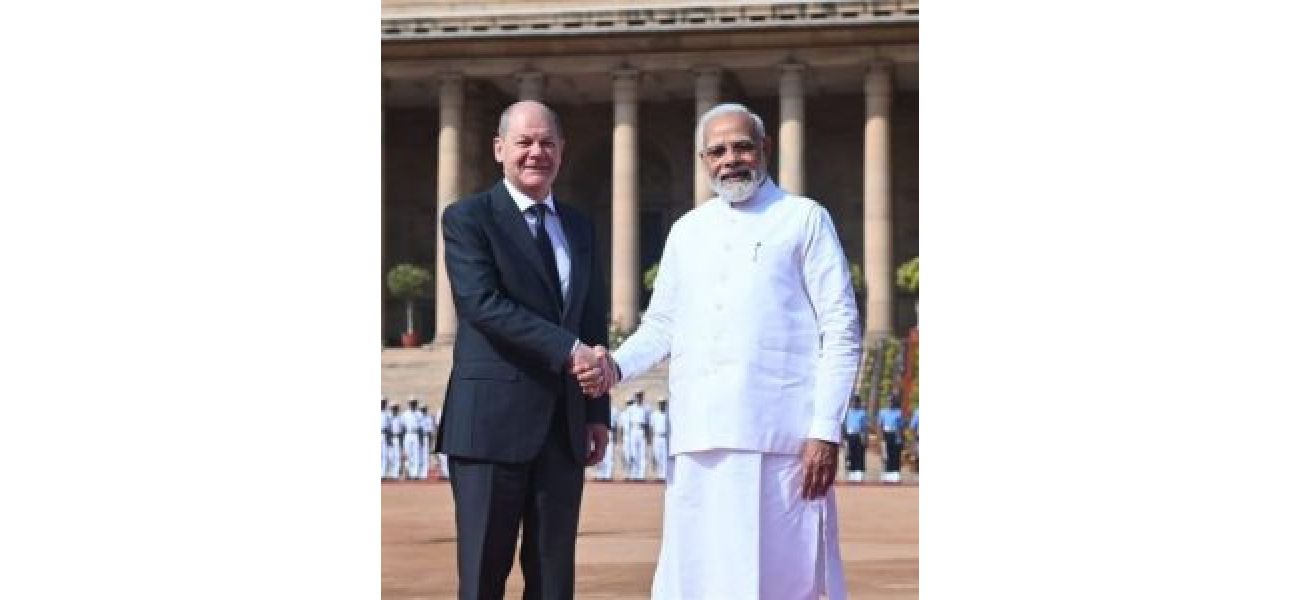India and Germany have agreed to increase cooperation in areas of renewable energy and transportation.
During Olaf Scholz's trip to India, the two countries have agreed to enhance collaboration in renewable energy, urban development, agroecology, and mobility. Discussions on expanding engagement in these areas were a key focus of the development policy talks.
September 21st 2024.

As preparations are underway for German Chancellor Olaf Scholz's upcoming visit to India, both New Delhi and Berlin have come to an agreement to strengthen their partnership in various areas such as renewable energy, urban development, agroecology, and mobility. This was highlighted during the recent development policy negotiations led by India's Department for Economic Affairs and Germany's Federal Ministry for Economic Cooperation and Development, as shared by German officials on Saturday.
It was decided that the cooperation between India and Germany will continue in the coming years, with a special focus on the aforementioned key areas. This partnership is strategically guided by the "Partnership for Green and Sustainable Development," which was established in 2022 after a discussion between Prime Minister Narendra Modi and Chancellor Scholz. The German leader is scheduled to visit India next month.
"The relationship between Germany and India is based on trust and a long-standing strategic partnership," stated Barbara Schafer, the head of the German delegation at the negotiations. She further added, "This has been further demonstrated in 2024 by both sides. With the launch of the 'India-Germany Platform for Investments in Renewable Energy Worldwide,' we have solidified our commitment to each other."
This new initiative was launched on September 16 during the fourth RE-Invest in Gujarat's Gandhinagar. Schafer explained, "Through our commitments this year, Germany has shown its dedication to fulfilling its international obligations. However, it is not enough to just make commitments; we must also strive to achieve tangible results." She also highlighted the success of the Indo-German cooperation in various areas such as the construction of modern transmission lines and metros in Mumbai, Surat, and Ahmedabad.
Schafer also emphasized Germany's support towards making Indian agriculture more sustainable and resilient. She further shared that Germany is also working on projects in Peru and various African countries to leverage their strengths in those areas. These developments have set the stage for the upcoming government consultations between Prime Minister Modi and Chancellor Scholz in October.
Uwe Gehlen, the Head of German Development Cooperation in India and Minister Counsellor at the German Embassy, stated, "The term 'sustainable energy transition' takes on a new meaning when Germany and India join forces, setting a positive example not just in our own countries but also globally." This year, Germany has allocated more than Euros 1 billion for initiatives in renewable energy, transmission lines, energy distribution, urban development, mobility, forest ecosystems, water, sustainable agriculture, agroecology, and vocational education in India. This will also include cooperation with the National Mission for Clean Ganga.
In conclusion, the partnership between India and Germany in the areas of renewable energy, urban development, agroecology, and mobility is set to reach new heights with their continued efforts and cooperation. Both nations are committed to making a positive impact not only in their own countries but also globally.
It was decided that the cooperation between India and Germany will continue in the coming years, with a special focus on the aforementioned key areas. This partnership is strategically guided by the "Partnership for Green and Sustainable Development," which was established in 2022 after a discussion between Prime Minister Narendra Modi and Chancellor Scholz. The German leader is scheduled to visit India next month.
"The relationship between Germany and India is based on trust and a long-standing strategic partnership," stated Barbara Schafer, the head of the German delegation at the negotiations. She further added, "This has been further demonstrated in 2024 by both sides. With the launch of the 'India-Germany Platform for Investments in Renewable Energy Worldwide,' we have solidified our commitment to each other."
This new initiative was launched on September 16 during the fourth RE-Invest in Gujarat's Gandhinagar. Schafer explained, "Through our commitments this year, Germany has shown its dedication to fulfilling its international obligations. However, it is not enough to just make commitments; we must also strive to achieve tangible results." She also highlighted the success of the Indo-German cooperation in various areas such as the construction of modern transmission lines and metros in Mumbai, Surat, and Ahmedabad.
Schafer also emphasized Germany's support towards making Indian agriculture more sustainable and resilient. She further shared that Germany is also working on projects in Peru and various African countries to leverage their strengths in those areas. These developments have set the stage for the upcoming government consultations between Prime Minister Modi and Chancellor Scholz in October.
Uwe Gehlen, the Head of German Development Cooperation in India and Minister Counsellor at the German Embassy, stated, "The term 'sustainable energy transition' takes on a new meaning when Germany and India join forces, setting a positive example not just in our own countries but also globally." This year, Germany has allocated more than Euros 1 billion for initiatives in renewable energy, transmission lines, energy distribution, urban development, mobility, forest ecosystems, water, sustainable agriculture, agroecology, and vocational education in India. This will also include cooperation with the National Mission for Clean Ganga.
In conclusion, the partnership between India and Germany in the areas of renewable energy, urban development, agroecology, and mobility is set to reach new heights with their continued efforts and cooperation. Both nations are committed to making a positive impact not only in their own countries but also globally.
[This article has been trending online recently and has been generated with AI. Your feed is customized.]
[Generative AI is experimental.]
0
0
Submit Comment





